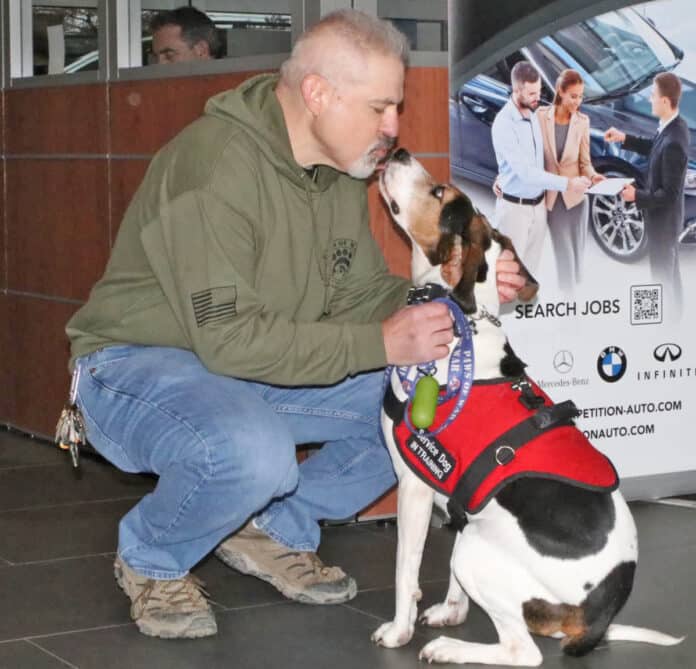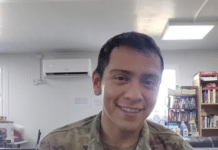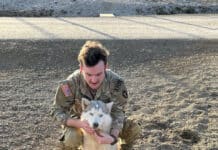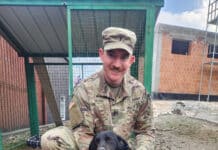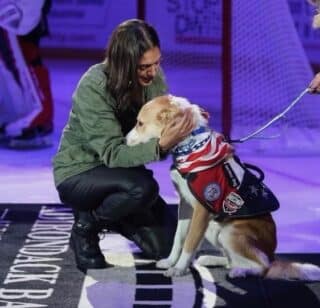
September is National Service Dog Awareness Month, highlighting the lifesaving and life changing difference these dogs make in people lives. These dogs help many veterans and first responders dealing with mental and/or physical traumas cope and overcome them. Advancements in understanding mental traumas like PTSD along with improved dog training techniques have allowed these dogs to bring healing and are a valuable tool in the fight to prevent suicide.
“Since 2014, we have been using rescued dogs and pairing them with veterans and first responders in weekly intensive training sessions that not only train the dogs, but provide a real sense of purpose and community for the heroes we serve,” says Robert Misseri co-founder of Paws of War. “There is not a week that goes by that we don’t hear from one of our teams telling us what a difference these dogs have made in their lives. Suicides prevented, marriages saved, families kept together, and so many other miracles.”
Veterans and first responders who have PTSD can significantly benefit from having a service dog, which is why Paws of War has made providing them with a trained dog one of their missions. Their program rescues dogs from shelters, trains them to become service dog for someone with PTSD, and then they provide the dog to a veteran in need, free of charge. Their work has changed lives and made it possible for these veterans to get help that improves their lives.
According to research published in the July 2022 issue of the journal PLOS ONE, the researchers conclude that service dogs are significantly associated with less PTSD severity and better mental health for some veterans. They believe this happens due to a partnership, or bond, formed between the veteran and service dog, which helps the person feel less anxiety.
Additional research, published in the journal Frontiers in Psychiatry in May 2022, reported that veterans and first responders who have PTSD who have a service dog show significantly fewer PTSD symptoms. They have better sleep quality and better overall well-being. Their study concludes that veterans with PTSD who have a service dog have an improved quality of life.
“Our goal is to continue helping veterans and first responders with PTSD to be paired with a service dog, so they can feel better and get more enjoyment out of life,” added Misseri. “We are grateful for those in the community who provide the financial support to help make this happen. We couldn’t do it without their support.”
Paws of War has many meaningful success stories that have come out of pairing a trained service dog with a veteran or first responder who has PTSD. Three that stand out include John Barnett, Rob Weisberg, and Angelique Williams.
A Navy veteran of the wars in Iraq and Afghanistan and a retired MTA police officer, John Barnett was injured in a violent attack when he was on duty has a service dog named Blue, trained by Paws of War. Barnett was stabbed in his eye while patrolling a train station platform. As a marathon runner, he feared he would no longer be able to run, because he was only able to see out of one eye. For the past eight years, Blue has not only guided him while he runs, but is his best friend, never leaving his side and helps Barnett get through the difficult times reliving that violent attack.
Commack volunteer fireman Rob Weisberg, whose heroic efforts at ground zero on 9-11 saved many lives. His experience setting up a triage in the FDNY Ten house, located across the street from the South Tower in the moments after the first plane hit have forever changed him. He has battled depression and suicidal thoughts, and credits Chip, his service dog trained by Paws of War for turning his life around. Weisberg, who once would not leave his house, recently hiked 1,850 miles of the Appalachian Trail, to bring awareness to veteran and first responder suicide and raise money to provide service dogs for people who struggled like he has.
Angelique Williams, a US Navy veteran with many years of military experience, provides her firsthand knowledge of the sacrifices and difficulties active military members face while deployed overseas. Buddy, her service dog, helps not only with mobility issues for injuries sustained during her deployment, but also helps her deal with her service related PTSD. She says “Buddy has given me a second lease on life, he has helped me get back into the world. For many years I suffered in silence hiding in my bed, he has brought back my passion for life, art and being outdoors.”
Paws of War has been operating worldwide since 2014, helping the military save the animals they rescue while deployed overseas. They have helped veterans with numerous issues, including suicide prevention, service and support dogs, companion cats and dogs, food insecurity, veterinary care, etc.Paws of War has a large loyal following of supporters and looks forward to working with new corporate sponsors to support these life-saving programs. To donate to support their mission, visit its site at http://pawsofwar.org.
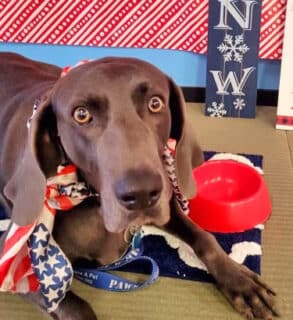

Cher Murphy is a Top PR Executive and brings with her a wealth of experience to her writing covering a variety of interesting fields. As an expert in public relations, she works with clients in some of the most popular sectors. With a nose for news and a gift of professional presentation, she is able to deliver high-quality, entertaining, and interesting stories on a regular basis.
Over the years, she has worked with media outlets such as Forbes, USA Today, Fox News, Today Show, Good Morning America, NBC Nightly News, Washington Post, L.A. Times, U.S. News & World Report, Wall Street Journal, and Consumer Reports among others. In the media world, her name has become synonymous with stories that keep consumers engaged, entertained, and interested.
All content herein is owned by author exclusively. Expressed opinions are NOT necessarily the views of VNR, authors, affiliates, advertisers, sponsors, partners, technicians, or VT Network. Some content may be satirical in nature.
All images within are full responsibility of the author and NOT VNR.
Read Full Policy Notice - Comment Policy






















